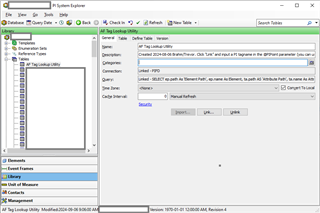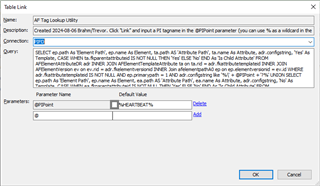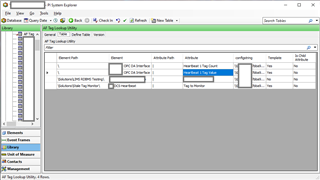Knowledge Share: A PI System Explorer solution for searching for PI Points used by PI AF Attributes
Over on the feedback portal there's a request dating back to 2017 (if the comments are accurate) to give users the ability to search for PI points used by AF attributes, in other words, addressing the issue, "I have this PI tag but I have no idea where it's used in AF!!!" The feedback item is still not included in System Explorer - or I wouldn't be writing this post!
Deep in the comment thread user taterhead247 offered up a great SQL query that looks into the PI AF SQL Database (PIFD table) to generate an answer; it returns a list of Elements and Attributes where a specific tag is used.
We had an insight to make this solution (slightly) more user-friendly and available to our PI power users within PI System Explorer.
First, PI power users were granted read-only access to the PIFD table.
Next, the PIFD table was configured as a Table Connection in PI System Explorer, with Security set to "impersonate client".
We then set up a Table called "AF Tag Lookup Utility" configured with a modified version of taterhead247's query:
- Connection: PIFD (or whatever you named the reference to this table)
- Query: SELECT ep.path As 'Element Path', ep.name As Element, ta.path AS 'Attribute Path', ta.name As Attribute, adr.configstring, 'Yes' As Template, CASE WHEN ta.fkparentattributeid IS NOT NULL THEN 'Yes' ELSE 'No' END As 'Is Child Attribute' FROM AFElementAttributeDR adr INNER JOIN AFElementTemplateAttribute ta on ta.rid = adr.fkattributetemplateid INNER JOIN AFElementVersion ev on ev.rid = adr.fkelementversionid INNER Join afelementpathA0 ep on ep.elementversionid = ev.id WHERE adr.fkattributetemplateid IS NOT NULL AND ep.primarypath = 1 AND adr.configstring like '%\' + @PIPoint + '?%' UNION SELECT ep.path As 'Element Path', ep.name As Element, ea.path AS 'Attribute Path', ea.name As Attribute, adr.configstring, 'No' As Template, CASE WHEN ea.fkparentattributeid IS NOT NULL THEN 'Yes' ELSE 'No' END As 'Is Child Attribute' FROM AFElementAttributeDR adr INNER JOIN AFElementAttribute ea on ea.attributeid = adr.fkattributeid INNER JOIN AFElementVersion ev on ev.rid = adr.fkelementversionid INNER Join afelementpathA0 ep on ep.elementversionid = ev.id WHERE adr.fkattributetemplateid IS NULL AND ep.primarypath = 1 AND adr.configstring like '%\' + @PIPoint + '?%'


Since power users can interact with linked tables in our ecosystem, they can open the table link properties with the Link button and update the Default Value for the PIPoint substitution parameter. They can then click OK and shift from the "General" tab over to the "Table" tab to see all of the Attributes where that PI tag was located in the database:

The use cases we can think of are:
- A calculated tag populated by an AF Analytic stops working or needs updating, but it's not immediately know where in the hierarchy the Element, Attribute, and Analysis are located.
- A user wants to add a tag to a hierarchy, but first wants to check on where else it might exist.
- A PI tag's properties are about to be changed (e.g. exception/compression), but we want to verify that won't impact any analytics or calculated tags.
This is as "user friendly" as we could make things for most power users in AF, but we also extended the functionality of this idea for super-duper-power users:
- A sharp co-op student wrote a script that takes any number of PI tags as an input and spits out an Excel spreadsheet that lists all references for all tags.
- We recognized that the adr.configstring like '%\' + @PIPoint + '?%' clause (that appears twice in the SQL query above) could be tweaked to identify not just PI tags but more types of attributes. A super useful use case for us is generating a list of Attributes referencing a specific linked table. So, by modifying the query clause to something like adr.configstring like '%SELECT%FROM%My_Production_Table%' you can quickly generate a list of all Attributes referencing a linked table.
Would love to hear feedback on how this could be improved for our users or other use cases - or if we have duplicated something that is well-known and obvious to others! Cheers


